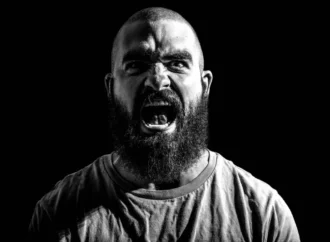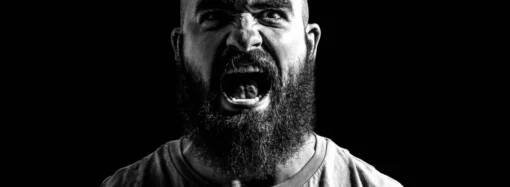Becky Kraker suffered from depression most of her life, but a couple years ago got medication that helped. For 18 months she felt like she finally had her life together, especially since the dissipating depression dramatically strengthened her relationship with her son. Then she got the Pfizer COVID-19 vaccine, her mental and physical health went haywire, and Becky felt she lost all the ground she’d gained.
Becky, 47, a resident of Minnetonka, MN, began experiencing an adverse reaction to the vaccine three days after she got the jab.
“My mood completely plummeted—to being suicidal.” Other than when she’d broken up with her partner years before, she’d never felt suicidal thoughts. “Also, I had itchiness all over, which dissipated after a few weeks,” she said, adding that her menstrual cycle went off-kilter, too.
Still, she wasn’t aware of the connection between her symptoms and the jab, so she got the second Pfizer shot a month after the first. Her symptoms continued and heart palpitations were added into the mix for two months.
Becky hadn’t planned on getting the vaccine—despite pressure she received to get it—but she was diagnosed with a nonmalignant brain tumor and surgeons strongly recommended she get it before having surgery to remove the tumor. So she got the shots, unnecessarily, it turned out, as she opted for radiation therapy in the end, fearing that surgery would result in some facial paralysis.
To treat her adverse symptoms, Becky was put on a couple treatments of Ivermectin, but no more. She’s kept up with her depression medication, and kept seeing her psychiatrist. She regrets getting the vaccine.
“I beat myself up over it for a long time, but I still struggle. There are days when I am below depressed,” Becky said.
Complicating matters, many of those she spoke with about her symptoms—family, friends, and doctors—downplayed their significance, and any possibility of them being connected to the vaccine. Even her gynecologist said she probably had menopause, or fibroids on her uterus. But test results proved her symptoms weren’t due to menopause.
She did get an admission of sorts from her psychiatrist, who said she wasn’t the only woman having menstrual issues after getting the vaccine.
“Something like 40 percent or more of us have had menstrual issues,” Becky said. “I do not trust doctors anymore.”
Her cycle was so off that sometimes she would miss it and at one point she had her period, unabated, for six months. At the time of this interview, she explained she’d been having her period nonstop for the last three weeks.
Although the menstrual issues and depression relapses continue, Becky’s health has improved somewhat. But it hasn’t helped that doctors haven’t openly connected her symptoms to getting the vaccine. “The fact that doctors refuse to put two and two together is astounding to me,” she said.
Even so, Becky has found some comfort in the fellowship of her family and friends and in her faith in God. But while her faith in God has helped her in her current struggle to regain her health, it’s been no cure-all. “My faith has been shaken and tried. But there are times when I feel hope,” she said.
She’s also found support from others who are advocating for vax-injured people. She believes vaccine-injured Americans deserve an appropriate response on this widespread issue from the government, rather than continuing with the stubborn denial that the COVID vaccines are anything but safe and beneficial.
Our government seems preoccupied with issues of little import to most Americans, such as the Ukraine war, Critical Race Theory, and gender and sexuality, too busy to help those injured from the COVID vaccine. But “if there’s anybody we should help, it should be those who did what their country called them to do by getting the vaccine,” Becky said.
So, what should the U.S. government do to help vaccine-injured people—whose injuries are the government’s fault since it wrongfully pushed a vaccine for an illness with a very low mortality rate?
“The first step would be for the government to admit there’s a problem,” Becky said, noting that perhaps just 1 percent of those who are vaccine-injured report it to VAERS. “There are many thousands of others who are vax-injured.”
Given that she willingly got the vaccine, it’d be understandable if Becky was reluctant to tell her story, but she isn’t.
“I’m extremely open—I don’t worry about people judging me. I’ve used my Facebook platform to make my views known,” she said. “There are a lot of people out there suffering. I want them to know they’re not alone, and that there are people here to support you. And I’m angry at my government, doctors, and Big Pharma.”
Those who feel they may have been injured by the vaccine should trust their gut, she advises.
“Do some investigating. Don’t listen to the mainstream media,” she said. “If you look, you’ll find answers you’re looking for and you’ll find a support group. Also, get a hold of your representative and make some noise. I think there are more of us recognizing this problem than those who aren’t.”
Even with her difficult past experiences, her faith, her support network, and the answers she’s found regarding her health problems, she’s still rather surprised by it all.
“I think the most devastating thing to me was losing the quality of life I’d finally found,” Becky said.
—
Image Credit: Pexels
10 comments















10 Comments
Marie Alsbergas
September 21, 2022, 4:19 amI refused the v@sine for both medical and religious reasons, alone in my family except one brother who also refused. In June, 2022 we all attended a large family reunion/grad party. 6 states were represented. We all became ill with some variant of SARS-COV-2. I alone was given Paxlovid. I suspect that I have mild Long Haul symptoms. My GP won’t confirm the diagnosis until 6 months have passed.
REPLYLike the author, depression and anxiety are lifetime issues for me. Also like her, faith and family help. But my physical changes are limiting the tasks which I can complete at work.
Rick Gordon
September 21, 2022, 9:11 pmI’m sorry to hear of her distress and experience with the vaccines. Regardless, for me, I will continue to listen to research findings and recommendations from the FDA, CDC, and family medical providers. Neither my wife nor I have suffered any affects or contracted the Chinese virus and have received the vaccine, 2 booster shots as well as the most recent additional booster.
REPLYLorri
September 22, 2022, 6:55 pmBecky, thank you for bravely sharing your story. Many people suffer with menstrual issues post vaccine and you brought this difficult issue to light.
10/21
42% of people with regular menstrual cycles bled more heavily than usual, and 66% of post-menopausal people reported breakthrough bleeding.
https://www.medrxiv.org/content/10.1101/2021.10.11.21264863v1.full
REPLYmy-assignment.help
September 27, 2022, 5:30 amReally informative article! Vaccines are one of the most important weapons we have against disease. By getting vaccines, you can help protect yourself and others from serious illness. Thank you!
REPLYCharles
September 28, 2022, 4:33 pmThe studies on this are inadequate.
Conclusion: Covid-19 vaccination is associated with a small and likely to be temporary change in menstrual cycle length but no change in menses length.
They studied only one cycle post vaccination. Women are being misled by the public health officials and doctors on what is truly happening to their fertility.
https://bmjmedicine.bmj.com/content/bmjmed/1/1/e000297.full.pdf
REPLYLorri@Charles
October 29, 2022, 12:19 amThe EU now adds this language to their informed consent.
Comirnaty and Spikevax: heavy menstrual bleeding added as a side effect
The PRAC has recommended that heavy menstrual bleeding should be added to the product information as a side effect of unknown frequency of the mRNA COVID-19 vaccines Comirnaty and Spikevax.
Heavy menstrual bleeding (heavy periods) may be defined as bleeding characterised by an increased volume and/or duration which interferes with the person’s physical, social, emotional and material quality of life. Cases of heavy menstrual bleeding have been reported after the first, second and booster doses of Comirnaty and Spikevax.
The PRAC finalised the assessment of this safety signal after reviewing the available data, including cases reported during clinical trials, cases spontaneously reported in Eudravigilance and findings from the medical literature.
After reviewing the data, the Committee concluded that there is at least a reasonable possibility that the occurrence of heavy menstrual bleeding is causally associated with these vaccines and therefore recommended the update of the product information.
REPLYMBA professional writers@Lorri
January 1, 2024, 1:21 amSorry to hear about her, depression is a serious issue that most people ignore. Depression can even take someone's life as it affects your mental health as well as physical health and makes you miserable.
REPLY